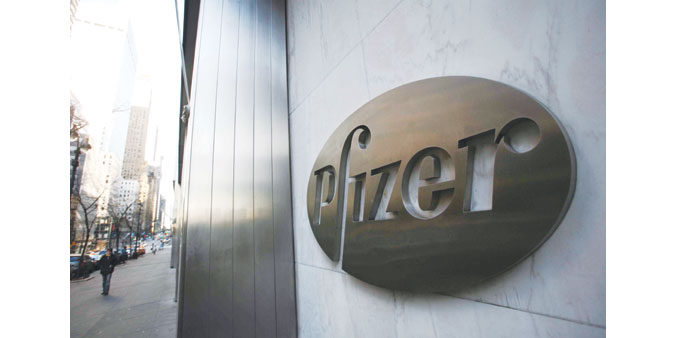Pfizer’s world headquarters in New York. The pharmaceutical giant is facing a mounting wave of lawsuits by women who allege that the company knew about possible serious side effects of its anti-cholesterol drug Lipitor but never properly warned the public.
Reuters
Pharmaceutical giant Pfizer is facing a mounting wave of lawsuits by women who allege that the company knew about possible serious side effects of its blockbuster anti-cholesterol drug Lipitor but never properly warned the public.
In the past five months, a Reuters review of federal court filings shows, lawsuits by US women who say that taking Lipitor gave them type-2 diabetes have shot up from 56 to almost 1,000.
Lawsuits began to be filed not long after the Food and Drug Administration in 2012 warned that Lipitor and other statins had been linked to incidents of memory loss and a “small increased risk” of diabetes. According to plaintiffs’ lawyers, women face a higher risk than men of developing diabetes from using Lipitor, and gain fewer benefits.
The recent spike in lawsuits followed a decision by a federal judicial panel to consolidate all Lipitor diabetes lawsuits from around the country into a single Federal courtroom in Charleston, South Carolina. Pfizer opposed the consolidation, arguing it would prompt copycat filings. The first case is scheduled to be tried next July.
Pfizer said in a statement that it denied liability and would fight the lawsuits. It is not uncommon for a drugmaker to get hit with thousands of lawsuits over its products after the FDA orders a label change alerting users to newly found risks. Takeda Pharmaceutical, for instance, is facing more than 3,500 federal lawsuits since 2011 when the FDA ordered it to update the label on its diabetes drug Actos to warn about bladder cancer. Takeda has denied liability.
But several factors set the Lipitor diabetes cases apart from those against other drug companies. For one, Lipitor is the best-selling prescription drug of all time, racking up global sales of more than $130bn since it went on the market in 1996. More than 29mn patients in the US have been prescribed the drug, suggesting there is a vast pool of potential plaintiffs. On the other hand, potentially complicating matters for plaintiffs, the FDA emphasized the benefits of statins even as it warned of the risks. When the labeling change was released in 2012, a top FDA official underscored that the agency still stood behind the drugs: “Clearly, we think that the heart benefit of statins outweighs this small increased risk (for diabetes),” Amy Egan, a deputy director for safety at the agency’s Division of Metabolism and Endocrinology, said in a statement at the time. Statins are a class of drugs that block the liver’s production of cholesterol to reduce the risk of heart disease. Type 2 diabetes, once known as adult-onset or noninsulin-dependent diabetes, is a chronic condition that affects the way the body metabolizes glucose.
The seemingly mixed message from the FDA suggests that litigation will focus on two questions: how big a diabetes risk do women using Lipitor face, and whether that risk is mitigated by the drug’s cardiovascular benefits.
H. Blair Hahn of Mount Pleasant, South Carolina, the lead lawyer appointed to represent Lipitor plaintiffs in federal court, said the plaintiffs contracted diabetes as a consequence of taking Lipitor, and that women with diabetes see the length and quality of their lives reduced.
“We will ask a jury to decide what it’s worth to take five years of someone’s life,” Hahn said. He said the nearly 1,000 cases filed so far represent 4,000 women, and that the number of cases could ultimately reach 10,000 or more.
Pfizer said it believes Lipitor did not cause the plaintiffs’ diabetes. Women who are prescribed Lipitor to control cholesterol may share other risk factors that make them vulnerable to the disease, such as high blood pressure or obesity, the company said.
The Pfizer statement said there is an “overwhelming consensus” in the medical community about statins’ benefits. The first Lipitor trial, scheduled for next July before US District Judge Richard Gergel, will be one of several so-called “bellwethers” used to gauge the strength of other cases. If Pfizer prevails, it could persuade plaintiffs to accept smaller settlements or drop cases.
Pfizer could also opt to settle before a single case is tried to avoid possible negative exposure or to prevent potentially damaging information from coming to light. If past settlements are any guide, Pfizer’s potential exposure could be substantial. Bayer, the maker of one-time rival statin Baycol, paid $1bn in 2005 to settle about 3,000 cases alleging the drug caused rhabdomyolysis, a disease that breaks down muscle tissue. Baycol was pulled from the market in 2001 after being linked to 31 deaths.

